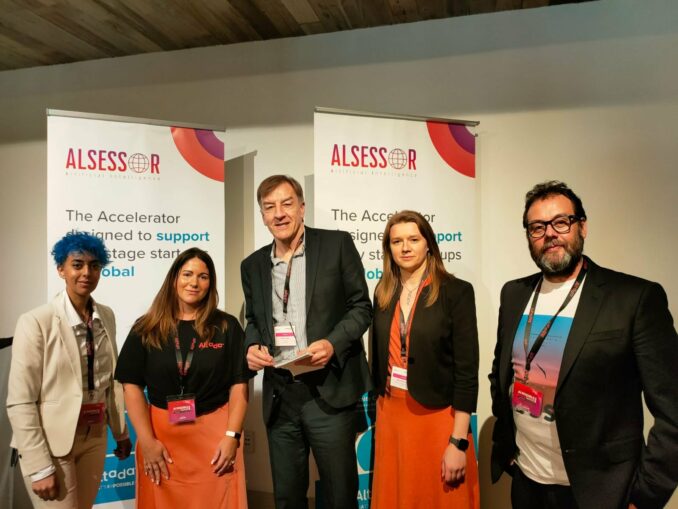
About Optimuse GmbH
- Founders: Dominik Petzen (CEO, Fabian Pitscheider (CPO), Felix Maximilian Hoffer (CTO)
- Founded in: 2021
- Employees: 3 employees and 2 freelancers
- Money raised: FFG funding https://www.ffg.at/, METABUILDING https://www.metabuilding-project.eu/, product launch will happen in 2023
- Ultimate goal: Revolutionize the construction industry and create an easier path towards climate neutral buildings.
If the EU wants to achieve its climate targets, buildings must also be planned more sustainably. One aspect that has been largely neglected so far is technical building equipment (TGA). One reason for this is that, to date, the work has been carried out manually and is both time-consuming and cost-intensive. Fabian Pitscheider, Dominik Pezzei and Felix M. Hoffer want to change this with their start-up Optimuse. The three have developed software that allows them to automate and make the complex planning situation transparent. In this episode of the Start-up-of-the-Day series, CEO Pezzei talks about the innovation and the challenges of starting up a company.

(c) Optimuse GMBH
What problem are you solving and why is it important?
Buildings are responsible for 36 percent of CO2 emissions and 40 percent of energy consumption in Europe. This is due in no small part to the under-digitized construction industry. We want to promote resource-saving and low-emission building industries and support them in implementing sustainability criteria. If we want to exploit the sustainable potential in the field of planning and reduce the energy consumption of buildings, then knowledge from various fields is necessary. This is knowledge that one person alone cannot bring to the table, which could result in poor quality or even errors.
We provide crucial expertise as a team, combining profound knowledge of architecture, building services engineering and economics. This allows us to incorporate all relevant factors with our software. Optimuse is based on generative design and artificial intelligence and makes it possible to juxtapose multiple design options for TGA (technical building equipment). This creates transparency at a very early stage of building design. When generating and optimizing the possible concepts, certification and customer-specific requirements are also included and compared.
How far along are you in research and development?
Technical building equipment is complex and we initially started in the area of fire protection, security systems, and camera systems. We are currently testing the first solution we developed with large planning offices to fine tune the final details. After that, we will move on to digitzing heating, air conditioning and ventilation, the so-called top tier in the field of technical building equipment.

What does fully automated technical building equipment mean for the construction industry?
Architects upload their plan to our platform and receive several options for optimal planning within a few minutes. Until now, this process has dragged on for weeks or even months. Our process leads to a change in the role of TGA planners, who would no longer draw pipes, for example, but only evaluate Optimuse’s proposals and possibly make small adjustments. Evaluation raises questions such as: What is the best option to save material, optimize costs or transport air better? These are aspects that have not been considered in detail so far due to time and cost constraints, but which have an impact on building comfort, energy consumption and sustainability.
What was the biggest obstacle you had to overcome?
The slow pace of digitization and outdated structures and processes of the construction industry in the DACH region can be very frustrating. There is little willingness to change established processes. In such an environment, it is very challenging to drive innovation. The market is also very fragmented and consists of mainly small and medium-sized companies, which often do not have the resources to invest in digitization.
We are still validating our business model. There are also great opportunities to develop concepts in the area of novel building cooling and ventilation.
What accomplishments have made you most proud?
Seeing that you’re spurring innovation that hardly exists globally yet. We are one of three research groups worldwide that want to digitize technical building equipment. As a result, we also get great reactions to our presentations. I firmly believe that we have developed unique software that will really have a positive impact on the building industry and climate change. I also believe that we have developed unique software that can have a positive impact on the construction industry and climate change.
In our company, every milestone achieved is appropriately celebrated and always represents a nice moment. Seeing how the team grows, how the cohesion among colleagues becomes stronger and stronger, and how each individual team member outgrows himself or herself makes me very happy as a founder.
Was it difficult to get funding?
So far, we have been supported by public research funding at the federal and EU level. The public is increasingly aware of climate issues and it is clear that action is needed. This makes funding our deep-tech start-up easier.
Where would you like to be with Optimuse in five years?
In the long term, we want to make it as easy as possible to design and build buildings sustainably. In the next five years, we hope to revolutionize the construction industry and enable carbon-neutral buildings at scale.
What makes your innovation better or different than existing things?
Other software products merely provide supporting tools, whereas we generate automated options for building services. Due to our approach of full automation and full generation, we are able to automatically generate many optimal planning alternatives within a very short time.
In automated planning, we consider local legislation and are committed to always integrating EU taxonomy and Environmental, Social, Governance (ESG) regulations in our software.








